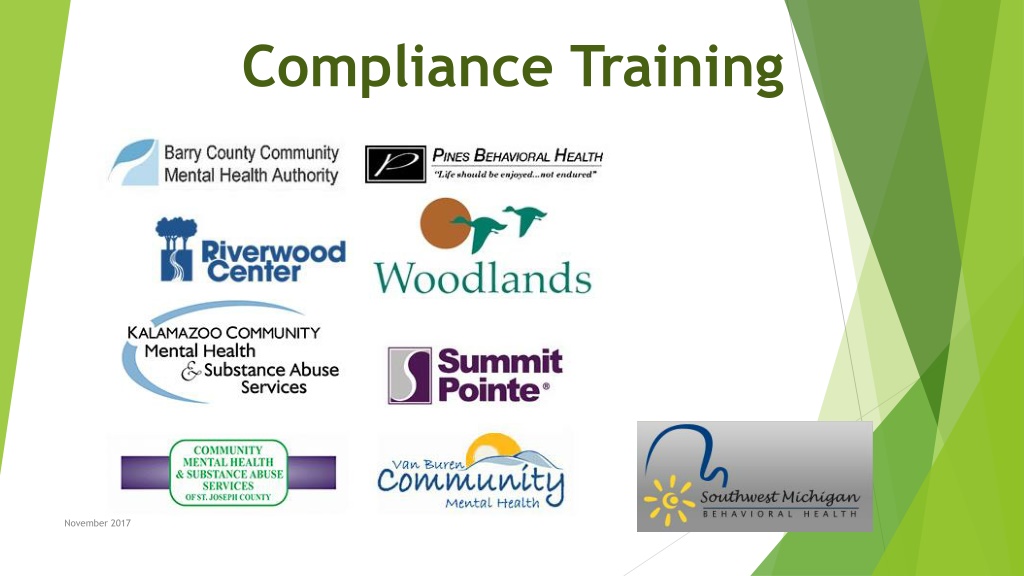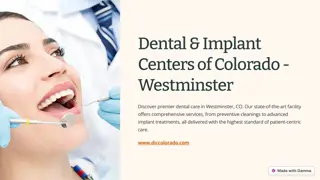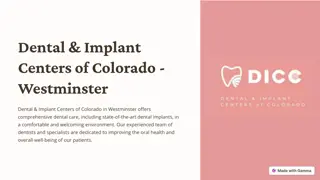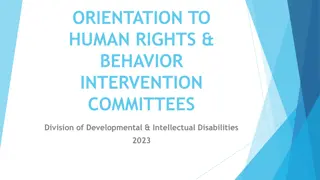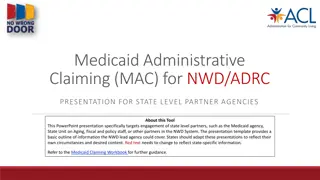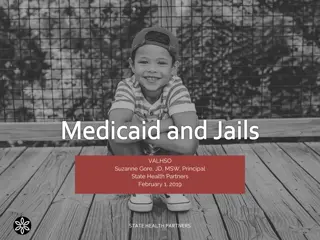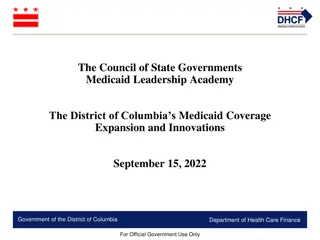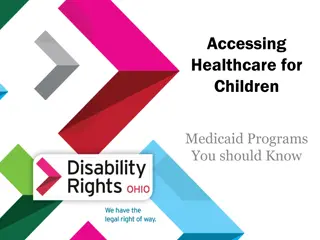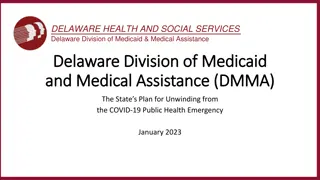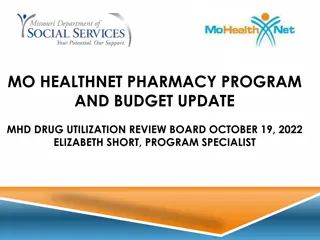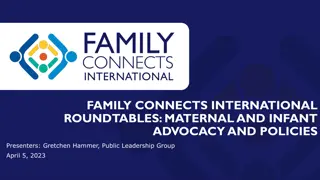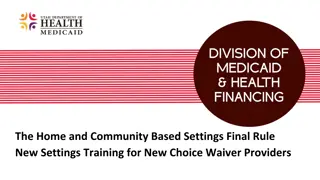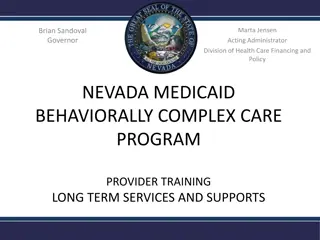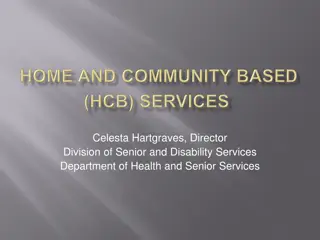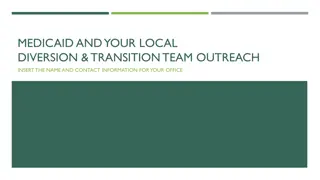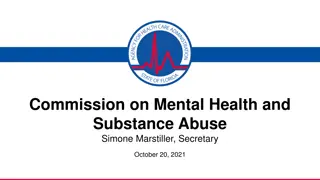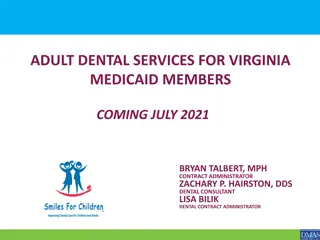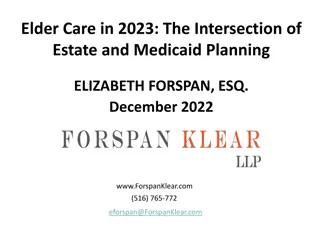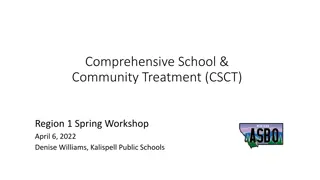Medicaid Program Compliance Overview
Overview of the Medicaid program administration for behavioral health services, emphasizing the roles of federal, state, county, regional, and local entities in ensuring compliance. Details include the structure of Medicaid funding, administration responsibilities, and the importance of compliance at various levels of the healthcare system.
Download Presentation

Please find below an Image/Link to download the presentation.
The content on the website is provided AS IS for your information and personal use only. It may not be sold, licensed, or shared on other websites without obtaining consent from the author. Download presentation by click this link. If you encounter any issues during the download, it is possible that the publisher has removed the file from their server.
E N D
Presentation Transcript
Compliance Training November 2017
Compliance Staff for Barry County Community Mental Health Authority Brenna Ellison Corporate Compliance Officer Mail: 500 Barfield Drive, Hastings Michigan 49058 Phone: 269-948-8041 x142 Fraud Report Hot Line: 800-218-8290 2
Overview of Medicaid Program Administration for Behavioral Health Services The Medicaid Program is funded by both the federal and state governments, and is directly administered by the States with approval and oversight by CMS. Center for Medicare and Medicaid Services (CMS) 1. FEDERAL. CMS provides operational direction and policy guidance to the States and to healthcare providers. 3. REGIONAL. MDHHS contracts with Prepaid Inpatient Health Plans (PIHPS) to manage Behavioral Health benefits (mental health and substance use disorder) in 10 regions across Michigan. 2. STATE. The Michigan Department of Health and Human Services (MDHHS) oversees the administration of the Medicaid Program for Michigan. State of Michigan - MDHHS 4. COUNTY. SWMBH contracts with SUD Providers and with each of the CMHSPs in Region 4 to provide Mental Health and SUD services to Region 4 customers. SWMBH (Region 4 PIHP) SUD Providers KCMHSAS Woodlands Barry Co. CMHA CMHSAS of St. Joseph Summit Pointe 5. LOCAL. Each CMHSP contracts with various service providers to provide mental health services to the customers located in that CMHSP s county. Pines Riverwood Center Van Buren CMH 3 Service Providers
What is Compliance? Doing the Right Thing! What does this look like in an ORGANIZATION S BEHAVIOR? A formal program specifying an organization s policies, procedures, and actions within a process to help prevent and detect violations of laws and regulations. What does this look like in INDIVIDUAL BEHAVIOR? Following laws and rules that govern healthcare; Being honest, responsible, and ethical; Preventing, detecting, and reporting unethical and illegal conduct; Preventing, detecting, and reporting Fraud, Waste, and Abuse (FWA) of Federal and/or State funds; Auditing and Monitoring to make sure funds are being used correctly. 4
The Seven Elements of an Effective Compliance Program 1. Implementing written policies, procedures, and standards of conduct Code of Conduct; Corporate Compliance Plan; Policies & Procedures located on the s-drive 2. Designating a compliance officer and compliance committee Compliance Officer (Brenna); Compliance Committee, Regional Compliance Coordinating Committee 3. Conducting effective training and education Education Plan: at hire; annually via computer; annually in-person; role based trainings; regulatory updates 4. Developing effective lines of communication Open-door policy to Compliance Officer; Anonymous reporting; Whistleblower protections 5. Conducting internal monitoring and auditing Annual FY Compliance Audit & Monitoring Plan; Provider Network Reviews; IT Audit Plan 6. Enforcing standards through well-publicized disciplinary guidelines Code of Conduct, Corporate Compliance Plan, and Policies & Procedures 7. Responding promptly to detected offenses and undertaking corrective action All reports of wrongdoing will be promptly and confidentially investigated, and appropriate remedial action taken (can include Corrective Action Plans, repayments, notification to outside government agencies, training, etc.). 5
BCCMHA STANDARDS OF CONDUCT Ethics Code of Conduct Confidentiality: Protect the privacy of those we serve Alcohol & drug free environment Free of harassment of any kind Avoidance of conflict of interest Report any suspected or actual FWA Do not solicit or accept gifts Safe, respectful work environment: all employees will be treated with dignity and respect Political contributions will not be made with agency funds or resources Carefully read and understand the Code of Ethics associated with your professional license (MSW, LLP, LPC, etc. all have a different Code of Ethics) Establish and maintain healthy boundaries with consumers, families, and colleagues Avoid using your workplace as a way to promote personal interests or paid endeavors Immediately warn if a consumer discloses intent to harm self or others Ensure continuity of treatment and services (transfer and discharge responsibilities) Avoid sexual impropriety Adequately document services/billings/communications Treatment should be suitable to condition (amount, scope, duration matches the need) 6
INTERSECTION OF COMPLIANCE AND ETHICS Organizational Ethics What is the role of compliance when it comes to ethics? Support the organization toward an ethical culture. OIG Compliance Guideline states one purpose of compliance program is to, ..increase the likelihood of preventing, identifying, and correcting unlawful and unethical behavior at an early stage In Other Words, ethical culture , it is the extent to which an organization regards its values. Strong ethical cultures make doingwhat is right a priority. Ethical culture is often unwritten code by which employees learn what they should think and do . - Ethical Culture Building: A Modern Business Imperative, Research Report, ERC 7
Laws Impacting Healthcare Deficit Reduction Act 2005 Education and training for employees, contractors and agents that contains detailed information about the Federal False Claims Acts, whistleblower provisions, and information about preventing and detecting Fraud, Waste, and Abuse in the Federal health care programs. Written policies that include detailed provisions consistent with State and Federal False Claims Acts, whistleblower provisions, and other applicable laws. Employee Handbook must include State and Federal laws, rights of employees to be protected as Whistleblowers, and any related policies and procedures It s about Education, Written Standards, and creating increased joint oversight between Federal and State governments 8
Laws Impacting Healthcare FEDERAL FALSE CLAIMS ACT Federal statute that covers fraud involving any federally funded contract or program, including the Medicaid program. Establishes civil liability for certain acts, including: Knowingly presenting a false or fraudulent claim to the government for payment; Knowingly making, using, or causing to be made or used, a false record or statement to get a false or fraudulent claim paid or approved; Conspiring to defraud by getting a false or fraudulent claim allowed or paid; Knowingly making, using, or causing to be made or used, a false record or statement to conceal, avoid, or decrease an obligation to pay or transmit money or property to the government. Knowingly means: Actual knowledge of the information; Acting in deliberate ignorance of the truth or falsity of the information; or Acting in reckless disregard of the truth or falsity of the information. **No proof of specific intent to defraud is required!!** 9
Laws Impacting Healthcare Examples: Up-coding Billing for unnecessary services Billing for services or items that were not rendered Billing for items or services performed by an excluded individual Failing to repay overpayments within 60 days of identification Penalties: Civil monetary penalties ranging from $5,500 to $11,000 for EACH false claim; Treble damages three times the amount of damages incurred by the federal government related to the fraudulent or abusive conduct; Exclusion from participation in State and Federal programs; Federal criminal enforcement for intentional participation in the submission of a false claim. 10
PRACTICE Laws Impacting Healthcare FEDERAL FALSE CLAIMS ACT PROBLEMS?? Consumer Sally B. was scheduled for 60 minutes of psychotherapy with Dr. Smith. Sally arrived for her appointment extremely distraught and in crisis. The receptionist immediately contacted an ambulance. While waiting for the ambulance, Sally never left the waiting room. Dr. Smith interacted with Sally for approximately 5 minutes until the ambulance arrived and transported her to a nearby hospital. Dr. Smith had 60 minutes scheduled for Sally B. and was unable to schedule other consumers during that time block. He also saw Sally B., even if it was for 5 minutes. Dr. Smith submitted a claim for Sally B. s visit, for 60 minutes of psychotherapy. The claim was paid out of Medicaid. A month later, as part of a routine Medicaid Services Verification audit, Sally B. s claim was selected as part of the audit sample. When auditors contacted Dr. Smith s office to obtain documentation to support the service billed, he instructed his receptionist (the one who called the ambulance) to create a Progress Note for 60 minutes of Psychotherapy, furnished to Sally B. on the day she went to the hospital. The receptionist created the note, Dr. Smith signed it and dated it the day Sally B. went to the hospital, and the Progress Note was provided to the auditors to support the service billed. 11
Laws Impacting Healthcare MICHIGAN FALSE CLAIMS ACT Mirrors the Federal False Claims Act, with expanded definition of knowledge MCL 400.602 Knowing and knowingly means that a person is in possession of facts under which he or she is aware or should be aware of the nature of his or her conduct and that his or her conduct is substantially certain to cause the payment of a Medicaid benefit. Knowing or knowingly includes acting in deliberate ignorance of the truth or falsity of facts or acting in reckless disregard of the truth or falsity of facts. Proof of specific intent to defraud is not required. (Emphasis added) Allows for constructive knowledge. This means that if the course of conduct reflects a systematic or persistent tendency to cause inaccuracies then it may be fraud, rather than simply a good faith error or mistake. 12
Laws Impacting Healthcare OTHER APPLICABLE LAWS Anti-Kickback Statute Health care providers and suppliers MAY NOT give or receive remuneration in exchange for the referral of patients or services covered by Medicaid or Medicare Exclusion Authorities Providers must ensure that no Federal Funds are used to pay for any items or services furnished by an individual who is debarred, suspended or otherwise excluded from participation in any federal health care program. This includes salary, benefits, and services furnished, prescribed, or ordered. Civil Monetary Penalties Law Allows the Office of the Inspector General (OIG) to impose civil penalties (MONEY) for violations of the Anti-Kickback Statute and other violations including submitting false claims and making false statements on applications or contracts to participate in a Federal health care program Criminal Health Care Fraud Statute Makes it a criminal offense to knowingly and willfully execute a scheme to defraud a health care benefit program. Health care fraud is punishable by imprisonment of up to 10 years, and fines of up to $250,000. Specific intent is not required for conviction. 13
Laws Impacting Healthcare WHISTLEBLOWER PROTECTION Federal Statute Designed to protect against the fraudulent use of public funds by encouraging people with knowledge of fraud against the Government to blow the whistle on wrongdoers. Individuals can file a Qui tam lawsuit on behalf of the government. The law provides for a reward in the form of a share of the recovery. Anyone initiating a qui tam case may not be discriminated or retaliated against in any manner by their employer. The employee is authorized under the False Claims Act to initiate court proceedings to make themselves whole for any job related losses resulting from any such discrimination or retaliation. Michigan Statute Provides protection for employees who report a violation or suspected violation of a State or Federal law, rule, or regulation to a public body; unless the employee knows the report is false. Employers may not discharge, threaten, or otherwise discriminate against an employee regarding the employee s compensations, terms, conditions, location, or privileges of employment. 14
FRAUD, WASTE, & ABUSE FRAUD An intentional deception or misrepresentation by a person with the knowledge the deception could result in unauthorized benefit to him/herself or some other person. Includes any act that constitutes fraud under applicable Federal or State laws. Can include billing for services not rendered, performing medically unnecessary services solely to obtain payment, altering documentation to obtain higher payment (upcoding), and deliberate duplicate billing. Example Dr. Smith s submission of a claim for a service not rendered, and creation of a fake progress note to support that claim. 15
FRAUD, WASTE, & ABUSE WASTE Overutilization of services, or other practices that result in unnecessary costs. Generally not considered caused by criminally negligent actions, but rather the misuse of resources. Can include healthcare spending that can be eliminated without reducing the quality of care, redundant testing EXAMPLE Consumer received an Assessment from Provider A last month. There has been no significant change in Consumer s condition, nor any change in the treatment being delivered. Provider A performs another Assessment and submits a claim for payment. 16
FRAUD, WASTE, & ABUSE ABUSE Practices that are inconsistent with sound fiscal, business or medical practices & result in an unnecessary cost to the payor, or in reimbursement for services that are not medically necessary or fail to meet professionally recognized standards for healthcare. Can include submitting claims that do not comply with billing guidelines, providing services that are not medically necessary or do not meet professionally recognized standards, submitting bills to Medicare/Medicaid instead of the primary insurer. CAUTION Abuse can develop in to Fraud if there is evidence that the individual knowingly and willfully (on purpose) conducted the abusive practices. EXAMPLE Provider A has multiple sites and determined it made billing easier if all claims were submitted listing a single location of service, and a clinician associated with that location of service, rather than the claims reflecting the clinician who actually furnished the service, and the location where it was actually furnished. 17
Service Documentation Requirements Michigan Medicaid Provider Manual requirements (non-exhaustive list) The clinical record must be sufficiently detailed to allow reconstruction of what transpired for each service billed. All documentation must be signed and dated by the rendering health care professional Documentation, including signatures, must be legible If a signature is not legible, the clinician s name and credentials should be printed below Self Determined services should be signed and dated on the date of the service. For services that are time-specific according to the procedure code billed, providers must indicate in the medical record the actual begin time and end time of the particular service SWMBH Operating Policy 12.11 Clinical Documentation (non-exhaustive list) Progress notes must include a Description of Service that describes: Presenting problems, treatment modality, customer response to treatment Goal(s) and/or Objective(s) of the Plan of Service addressed Progress/lack thereof toward desired outcome Current status of the customer/Future treatment recommendations 18 Specific clinician/staff interventions offered during the service contact
PRIVACY & CONFIDENTIALITY Behavioral Health Records Breach Notification A breach occurs when there is an unauthorized acquisition, access, use, or disclosure of PHI that compromises the security or privacy of that information. Depending on the circumstances, a breach may require notice to the consumer that his/her information was inappropriately released, mitigation efforts such as credit monitoring, notification to local media, and/or notification to the Office for Civil Rights (OCR). If you suspect or know of any situation involving a potential breach, it is your responsibility to report it to the Compliance Department. Examples: Sending a letter containing PHI to the wrong address Medical records/laptop being lost or stolen 19 Posting about a consumer on social media
Enforcement Bodies Center for Medicare and Medicaid Services (CMS) Federal Agency with the US Department of Health and Human Services (HHS) that administers the Medicare program and work in partnership with state governments to administer Medicaid programs. Office of the Inspector General (OIG) Enforcement division of the Federal Health and Human Services (HHS) agency, and of the Michigan Department of Health and Human Services. In charge of investigating Fraud, Waste, and Abuse in the Medicaid/Medicare Programs, and pursuing civil judgments under the Civil Monetary Penalties Law. Office for Civil Rights (OCR) In charge of enforcing HIPAA Privacy and Security Rules. Levy huge civil penalties against entities that violate HIPAA. Implement and monitor Corporate Integrity Agreements. Department of Justice (DOJ) Federal enforcement agency in charge of criminally prosecuting individuals/entities under applicable Federal laws. Works collaboratively with the OIG. Michigan Attorney General Health Care Fraud Division in charge of investigating Fraud, Waste, and Abuse in the Michigan Medicaid/Medicare Programs. Can prosecute individuals/entities criminally under applicable State laws. 20
REPORTING RESPONSIBILITIES It is your right, and your responsibility to report actual and suspected Compliance violations to the CMHSP s Compliance Officer and/or SWMBH s Compliance Officer. You may not be intimidated, threatened, coerced, discriminated against, or subjected to other retaliatory action for making a good faith report of an actual or suspected violation. SWMBH Compliance Reporting CMH Compliance Reporting Compliance Hotline: 1-800-783-0914 Compliance Hotline: 1-800-218-8290 In-person, by telephone, or via email to: Mila C. Todd, Esq., CHC Chief Compliance & Privacy Officer 5250 Lover s Lane Suite 200 Portage, MI 49002 (800) 676-0423 mila.todd@swmbh.org In-person, by telephone or via mail to: Brenna Ellison LLMSW CAADC Corporate Compliance Officer 500 Barfield Drive Hastings, MI 49058 (269) 948-8041 21
